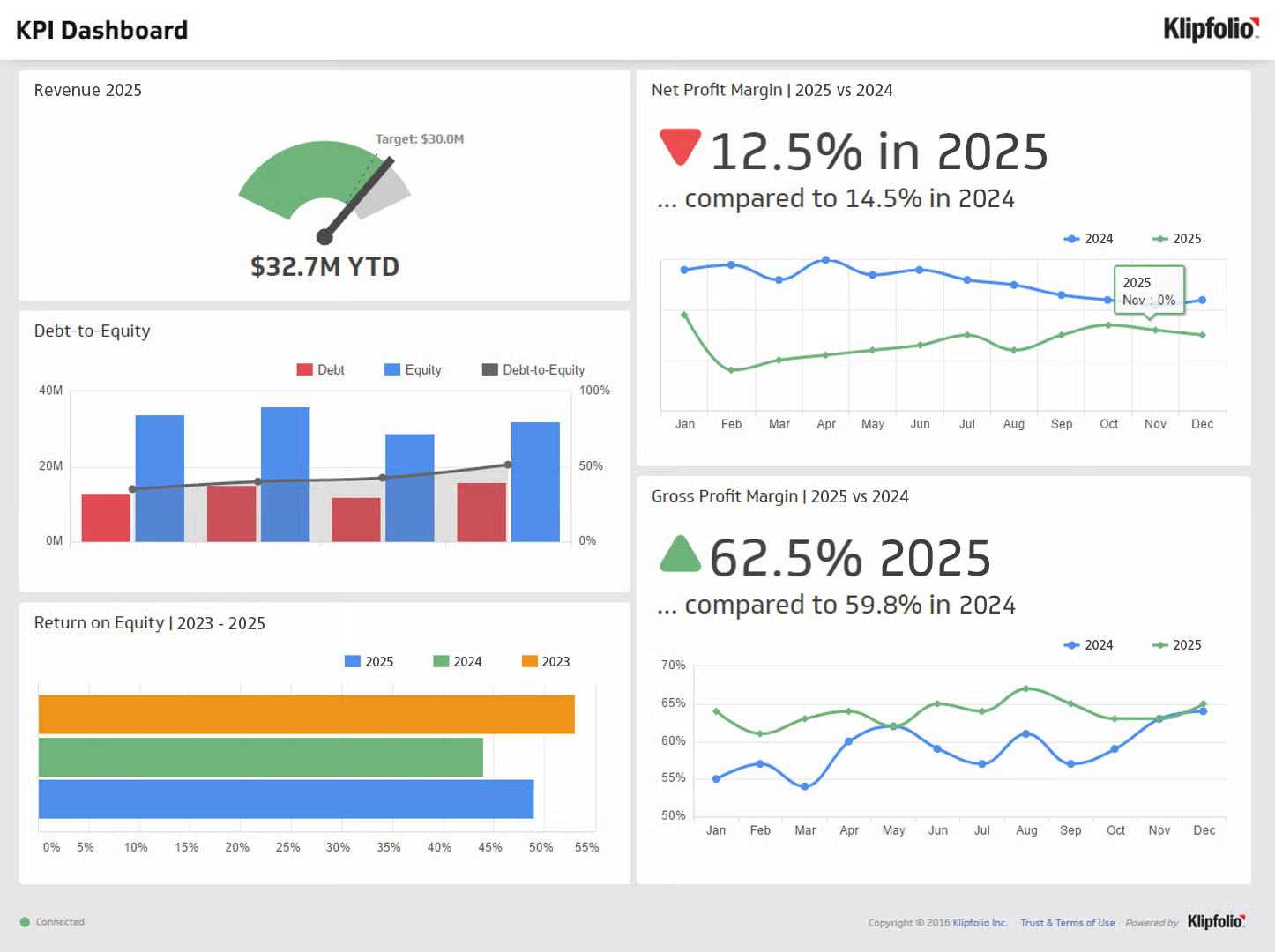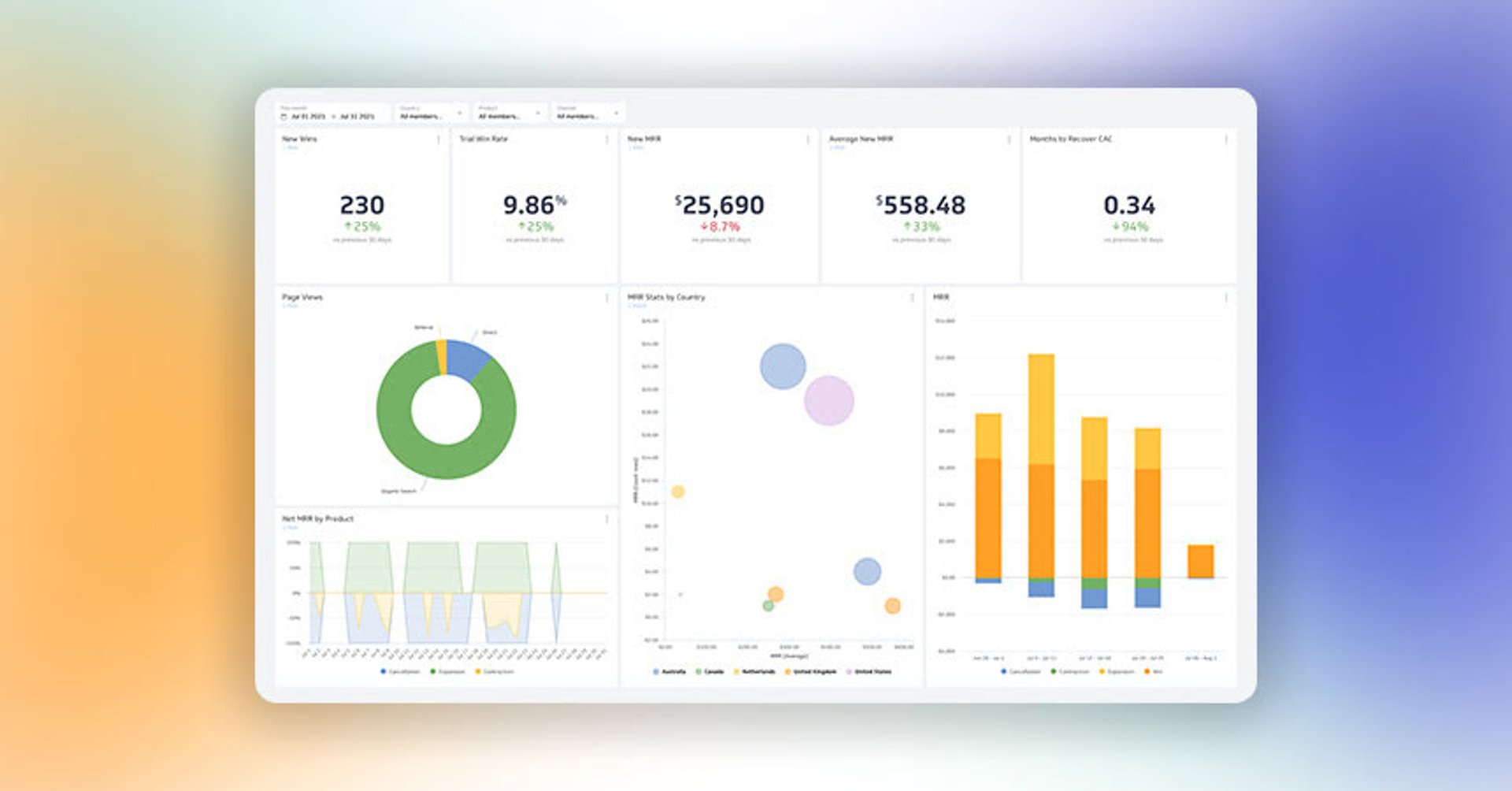The Mistakes Companies Make When Setting KPIs

Published 2026-02-18
Summary - Avoid the most common KPI mistakes. Learn what to measure, how to keep KPIs specific, actionable, and alive, and how to share results with clear dashboards in Klipfolio Klips.
Key performance indicators (KPIs) can guide better decisions and improve sales and productivity.
They help you measure and understand progress, with results that let you evaluate success through quantitative outcomes.
There’s a fine art to making KPIs deliver. Many organizations make significant errors when defining them, which wastes time and resources. Choose the right approach from the start.
Understanding What to Measure
One reason mistakes happen is a lack of clarity about what to measure.
In HubSpot’s Metrics That Matter to Your CEO, the inbound marketing team highlights common challenges:
- Not knowing what to measure
- Confusion about how metrics shape strategy
- Uncertainty about merging marketing results with business objectives
- How to synchronize data across the business
- Understanding results and any disappointments they reveal
The goal is to capture the relevant data you need. As HubSpot puts it:
“Results ultimately stem from the right activities. So working backwards from the end goal like revenue to the front end of the sales process will actually help the salesperson understand the necessary activity to achieve their goal.”
Not Making KPIs Specific to Your Business
Many teams collect data sporadically. They brainstorm, scan what others track, then copy KPIs that don’t reflect their context.
Common KPIs that work for others might not fit your sector or stage. Start with your goals and build from the information you already have.
Link your KPIs to strategy. This helps you focus on what matters most. You can turn to company data to find KPIs that matter, such as:
- Trending sales patterns
- Social media KPIs
- Google Analytics 4 metrics
- Insights from managers
- Insights from employees
- Feedback from directors
- Analyzing competitor performance
- Staff performance
- Profit margins
- Cash flow
- Marketing campaigns
- Customer journey and satisfaction
- Internal processes
- Business-wide learning and growth
Use data with care. Bernard Marr, a business advisor, often notes that most companies are data rich and insight poor.
“As business leaders we need to understand that lack of data is not the issue. Most businesses have more than enough data to use constructively; we just don't know how to use it. The reality is that most businesses are already data rich, but insight poor.”
In one of his YouTube videos he describes an example of a retailer struggling to take advantage of the right process.
In such instances, adaptability is important—along with the ability to admit to errors. Only then can you move forward and build on issues.
Micromanaging Through Excessive KPIs
Give employees room to breathe. KPIs can help, but too many can stifle creativity.
In The Tyranny of Metrics (2018), Professor Jerry Muller examines the belief that success requires quantifying everything, then rewarding or punishing based on the numbers.
He argues many organizations fixate on dashboards, charts, and spreadsheets instead of performance. Measurement should inform judgement, not replace it.
He explains:
“If what is actually measured is a reasonable proxy for what is intended to be measured, and if it is combined with judgment, then measurement can help practitioners to assess their own performance, both for individuals and for organizations. But problems arise when such measures become the criteria used to reward and punish—when metrics become the basis of pay-for-performance or ratings.”
Is this damaging business productivity? Muller argues it is. The solution is to take a step back and embrace some of the above techniques to provide your workforce with a chance to flourish with only a central set of KPIs to help drive your business forward.
Forgetting Unique Metrics
Look beyond the usual suspects. Consider additional, relevant metrics such as:
- Marketing initiatives that resulted in no business
- Lead generation effectiveness
- Sales cycle length and opportunities to shorten it
- Pipeline acceleration
Thinking outside standard norms, as long as the KPI is relevant, and the metric is named clearly, it can surface useful insights.
Have team input

Managers and directors often set KPIs, but input from employees is essential.
Transparency and an open environment help you uncover issues you might miss.
For example, a team member may identify a part of their role that needs tracking. If it’s sensible, implement it.
Failing to Act on KPI Results
A common issue with KPIs is failing to act on the findings, often due to busy schedules or limited resources.
It wastes effort to build tracking, surface insights, then ignore the results. This is especially costly when you track customer satisfaction and skip followup.
The fix: scale back to a manageable set of reports that support core duties. Assign clear owners. Siphon tasks to managers and teams so actions happen.
Conclusion: What your KPIs should display

Key performance indicators should align with your business:
- Objectives
- Goals
- Sales forecasts
When you review results at the end of a KPI period, check which business goals they support. Consider qualitative context. What does the data show? What will you do next?
KPIs aren’t set in stone. Review them each quarter. Refine where needed. Over time, this delivers better results.
With Klipfolio Klips, you can bring these KPIs into a realtime dashboard and share clear, onbrand reports with your team.
About the Author
Liverpool-born Alan Price FCIPD, CMgr, FCMI is a senior business figure and entrepreneur.
Alan Price is senior director at the multiawardwinning employment law consultancy, Peninsula; managing director of Peninsula Ireland; and Elected Director and Trustee for the Chartered Institute of Personnel and Development (CIPD).
Related Articles

Top 10 Marketing Dashboard Ideas for Tech Companies

17 KPIs Every Data-Driven Manager Needs to Lead Their Team
By Danielle Poleski — October 14th, 2025
7 ways to present KPIs that your management team will love
By Danielle Poleski — September 25th, 2025

